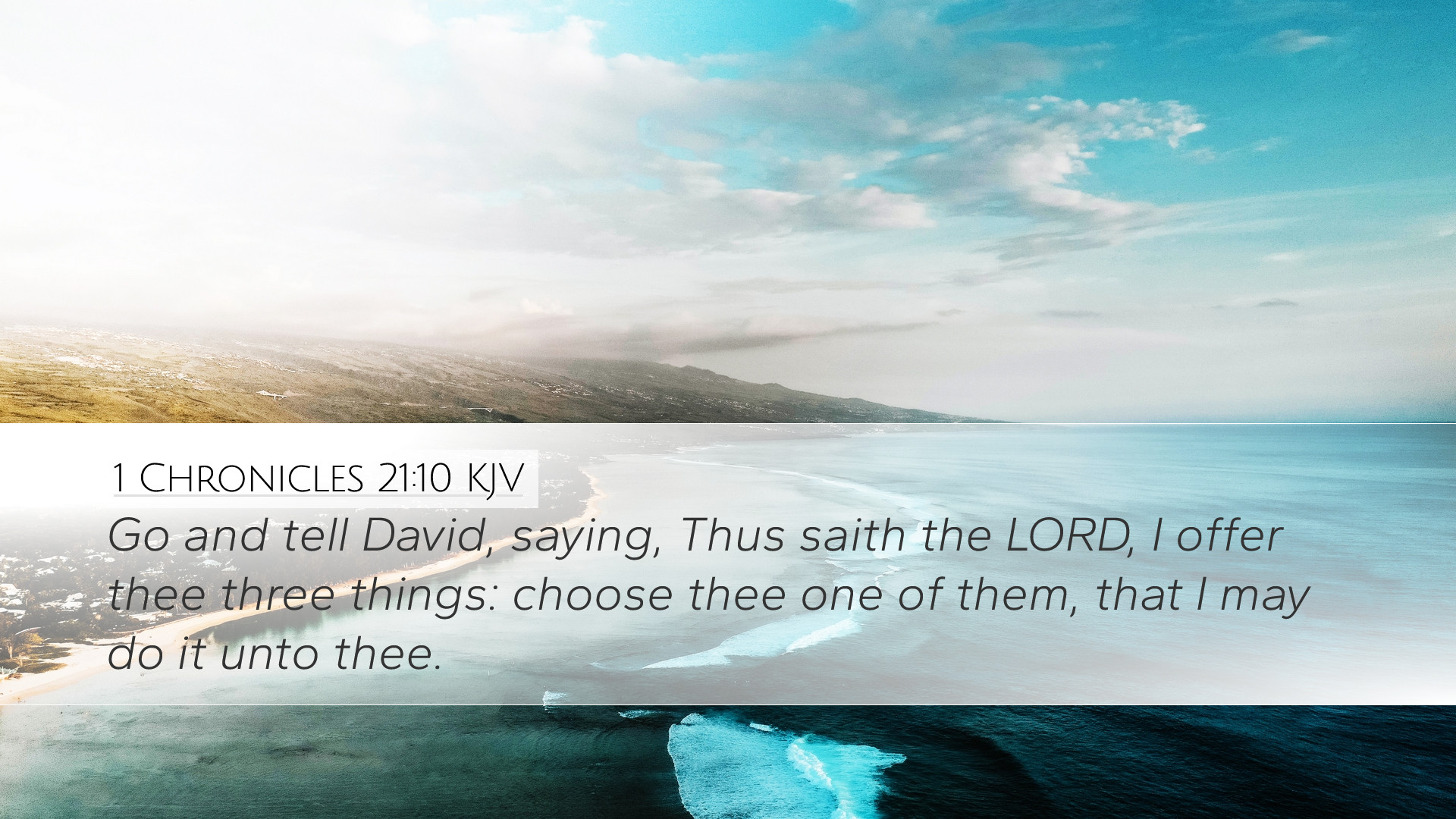Commentary on 1 Chronicles 21:10
Bible Verse: 1 Chronicles 21:10 - "Go and tell David, saying, Thus saith the LORD, I offer thee three things: choose thee one of them, that I may do it unto thee."
Contextual Overview
The narrative found in 1 Chronicles 21 recounts a significant moment in King David's life, reflecting on his pride and subsequent actions that brought judgment upon Israel. This event emphasizes themes of sin, repentance, and divine providence, hallmarks of the Biblical narrative.
Insights from Matthew Henry
Matthew Henry highlights the importance of discernment in leadership roles, particularly as it relates to the choices we face. He notes that God sent a direct message to David through the prophet Gad. This communication underscores God's direct involvement in the affairs of His people. David's decision-making process is crucial, illustrating the struggle between human inclination and divine command. Henry emphasizes that God gives options but also holds us accountable for our choices.
Insights from Albert Barnes
Albert Barnes provides a historical and theological examination, asserting that this verse reflects God's mercy intertwined with His judgment. The three options presented to David act as a divine test, revealing the heart of the king. Barnes points out the gravity of David's sin of numbering the people and how it resulted in serious consequences for the nation. This passage teaches that God’s discipline often comes with opportunities for repentance and grace. David's eventual choice reflects not only his character but also the profound implications of leadership.
Insights from Adam Clarke
Adam Clarke delves into the implications of the choice given to David, interpreting it as a demonstration of God's sovereignty in allowing free will within the bounds of His divine plan. Clarke notes that God does not impose His will but rather allows His servants the honor and burden of making choices that affect themselves and the people they lead. This verse is a pivotal point that showcases the intersection of divine providence and human volition, highlighting that while God remains sovereign, He respects the liberty of the human will.
Theological Reflections
- The Nature of Sin: David's sin in numbering the people reflects a common human tendency to rely on numbers and strength rather than the power of God. The choice given to David serves as a reminder of the seriousness of sin and its wider implications for the community.
- Divine Testing: The options presented indicate that God often tests His followers. The choices are not arbitrary; they serve a greater purpose in revealing our character and dependence on God.
- Repentance and Consequences: The passage offers a profound reminder that all choices have consequences. David's repentance in the face of impending judgment emphasizes God's grace and the possibility for redemption.
- Leadership and Accountability: This scenario illustrates the weight of responsibility that comes with leadership. God holds leaders accountable for their actions, impacting both their personal lives and those of their followers.
Practical Applications
- Decision-Making: Leaders must seek divine guidance when faced with critical decisions, understanding that our choices can lead to blessings or burdens.
- Community Impact: Like David, leaders must consider how their actions affect the wider community and prioritize the well-being of others in their decision-making.
- Accountability in Sin: Recognizing sin is crucial for personal and communal health. Leaders are tasked with both confessing and addressing sin to prevent larger consequences.
- Seeking God’s Mercy: In moments of failure, believers should remember that God grants opportunities for repentance and renewal, an essential aspect of the Christian faith.
Concluding Thoughts
The message conveyed in 1 Chronicles 21:10 is rich with implications for believers today. It serves as a reminder of the intricacies of divine sovereignty, the seriousness of sin, the importance of repentance, and the necessity for wise leadership. As students of the Word, we are encouraged to reflect on our decisions, to seek God's will diligently, and to remember that while we are free to choose, our choices carry weight and impact the lives of many.


